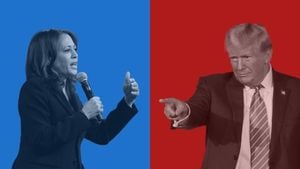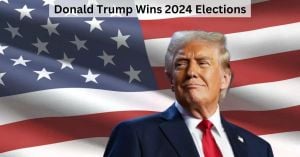With the 2024 U.S. presidential election drawing significant attention, the media has found itself under the spotlight, particularly examining its role during this election season. Media outlets have faced both commendations and severe criticisms for their coverage of key candidates, Donald Trump and Kamala Harris, and it seems there are clear winners and losers when it came to media narratives. While the election results were still being tallied, early reactions indicated the media's struggles to maintain credibility amid shifting public perceptions.
For many, the most visible loss belongs to the traditional media, often dubbed the "legacy media." This phrase encapsulates news organizations with established reputations struggling to evolve with the changing political and social landscapes. Donald Trump's candidacy has challenged these outlets directly, often placing them at odds with his supporters, and this election season has only intensified the discord. The media's extensive coverage of Trump, much of it focusing on scandal and negativity, backfired spectacularly, as noted by several analysts.
John Solomon, editor-in-chief of "Just the News," articulated this sentiment, describing the legacy media's apparent loss of credibility. He pointed out how the once-affluent media industrial complex found itself grappling with record lows of trust among voters, as people either turned away from their reporting or directly criticized it. Solomon noted, "Four years, four indictments, two assassination attempts, and countless bouts of biased coverage have led to growing public discontent. Instead of controlling the narrative, the media now struggles to understand this new political reality."
Such sentiments were echoed across multiple platforms, including the Media Research Center, which indicated dire statistics, highlighting how approximately 85% of the media's coverage of Trump has been overwhelmingly negative. This negativity permeated various election cycles, often leading the public to dismiss stories perceived as biased.
The recent election also revealed distinct personalities within media reporting, shaping opinions and perceptions among viewers. Charlamagne Tha God, co-host of The Breakfast Club, emerged as one of the few media figures who successfully navigated the tumultuous waters, positioning himself as someone who spoke candidly about the state of American politics. His straightforward interviews and calls for honesty were well-received, contrasting sharply with others who cloaked their commentary with jargon and double-talk. Charlamagne's pointed interviews brought to light the concerns many Americans have over the political climate, giving him unexpected prominence this election season.
Conversely, figures like Joe Rogan found themselves at the center of mixed reviews. The popular podcaster, known for his ability to attract large audiences, had hoped to leverage his platform to discuss topical issues during the campaign. Yet, his decision to conduct lengthy interviews with Trump, particularly one where he formally endorsed him, did not play out as expected. Instead, many critics felt Rogan missed the mark by avoiding open dialogue with other significant candidates like Harris, proving his flexibility to engage varied viewpoints was limited this season.
It was only natural for media scrutiny to extend toward another face of the Republican Party—Liz Cheney. Once viewed as a pariah within her party for standing against Trump's more radical elements, Cheney has seemingly reinvented herself. Standing resolutely alongside Democrats advocating for law and order practices, she has emerged as an unexpected media darling this election year. While she clocked plenty of airtime, many wondered if this newfound popularity could translate to political clout should Harris win.
On the other hand, Kamala Harris’s candidacy was riddled with challenges not purely from Trump’s camp but from the media itself. Critics focused squarely on her past remarks and decisions, often framing them within the narrative of causing her own campaign’s struggles. This framing only exacerbated the sentiment among Democrats who felt their own narrative was hijacked and morphed by the prevailing media environment. Some experts pointed out the irony of struggling narratives as it unfolded—many outlets criticized her campaign apparatus but prompted their own scrutiny for amplifying certain voices over others.
This year’s election also prompted discussions about voter turnout efforts and media propaganda. Reports claimed actions taken by media narratives during earlier presidential cycles had stifled honest discussions about potential issues. Campaigns and news cycles often collided to form biased presentations of events—further eroding public trusts.
Some analysts underscored how conspiracy theories often swelled within media discussions surrounding Trump, leading to several reputable polls reflecting heightened mistrust toward major networks. An anonymous television executive captured this sentiment perfectly when expressing fears about media presentations overshadowing facts: “If half the country perceives Trump as qualified for the presidency, then they’re not consuming this media at all. A Trump victory signifies traditional media’s death knell.”
This perceived detachment from forsworn objectivity now lies squarely on both Tom's and Harris’s shoulders, with many questioning whether these biases will ripple through future elections. With each failed narrative, confidence dwindled among traditional audiences toward networks promising objectivity. The results show how deeply ingrained these issues have become.
This election highlights something significantly more complex than previous cycles. Expectations have shifted as social media gains dominance over traditional platforms, and news consumes itself more so than ever before. Remarks by Solomon mention how the suppression of certain narratives, such as venture discussions on policy alternatives, could reinforce negative perceptions about media when viewed through rigged lenses. “The public now desires tangible, authentic engagement rather than scripted agendas attempting to cast puppet shadows.”
The interplay between traditional media and the current political environment raises pressing questions. How do voters navigate their media landscapes, and where do they find trustworthy reporting? The intertwining of media, their personalities, and the political arena tells us more about the ambitions of some and the pitfalls of others.
While clear distinctions have been made between winners and losers, this season was host to unexpected turnarounds and stark reminders of the nature of political engagements. Investments by voters have led the way through strengthening reform demands not simply from media, but all fundamental pillars of democracy. The urgency now lies in balancing authenticity with transparency, for as past narratives wane, it’s clear the media must adapt to the ever-changing expectations of its consumers.



